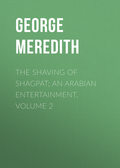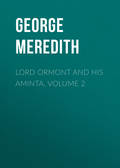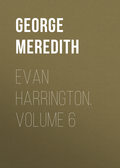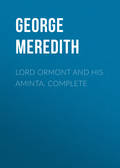
George Meredith
Vittoria. Volume 6
"Ah! you have not forsaken me," the greeting leaped out.
"Not now," said Rinaldo.
"Do you think of going?"
"I will speak to you presently, my friend."
"Hound!" cried Wilfrid, and turned his face to the wall.
Until he slept, he heard the rapid travelling of a pen; on his awakening, the pen vexed him like a chirping cricket that tells us that cock-crow is long distant when we are moaning for the dawn. Great drops of sweat were on Rinaldo's forehead. He wrote as one who poured forth a history without pause. Barto's wife came to the lamp and beckoned him out, bearing the lamp away. There was now for the first time darkness in this vault. Wilfrid called Rinaldo by name, and heard nothing but the fear of the place, which seemed to rise bristling at his voice and shrink from it. He called till dread of his voice held him dumb. "I am, then, a coward," he thought. Nor could he by-and-by repress a start of terror on hearing Rinaldo speak out of the darkness. With screams for the lamp, and cries that he was suffering slow murder, he underwent a paroxysm in the effort to conceal his abject horror. Rinaldo sat by his side patiently. At last, he said: "We are both of us prisoners on equal terms now." That was quieting intelligence to Wilfrid, who asked eagerly: "What hour is it?"
It was eleven of the forenoon. Wilfrid strove to dissociate his recollection of clear daylight from the pressure of the hideous featureless time surrounding him. He asked: "What week?" It was the first week in March. Wilfrid could not keep from sobbing aloud. In the early period of such a captivity, imagination, deprived of all other food, conjures phantasms for the employment of the brain; but there is still some consciousness within the torpid intellect wakeful to laugh at them as they fly, though they have held us at their mercy. The face of time had been imaged like the withering mask of a corpse to him. He had felt, nevertheless, that things had gone on as we trust them to do at the closing of our eyelids: he had preserved a mystical remote faith in the steady running of the world above, and hugged it as his most precious treasure. A thunder was rolled in his ears when he heard of the flight of two months at one bound. Two big months! He would have guessed, at farthest, two weeks. "I have been two months in one shirt? Impossible!" he exclaimed. His serious idea (he cherished it for the support of his reason) was, that the world above had played a mad prank since he had been shuffled off its stage.
"It can't be March," he said. "Is there sunlight overhead?"
"It is a true Milanese March," Rinaldo replied.
"Why am I kept a prisoner?"
"I cannot say. There must be some idea of making use of you."
"Have you arms?"
"I have none."
"You know where they're to be had."
"I know, but I would not take them if I could. They, my friend, are for a better cause."
"A thousand curses on your country!" cried Wilfrid. "Give me air; give me freedom, I am stifled; I am eaten up with dirt; I am half dead. Are we never to have the lamp again?"
"Hear me speak," Rinaldo stopped his ravings. "I will tell you what my position is. A second attempt has been made to help Count Ammiani's escape; it has failed. He is detained a prisoner by the Government under the pretence that he is implicated in the slaying of an Austrian noble by the hands of two brothers, one of whom slew him justly—not as a dog is slain, but according to every honourable stipulation of the code. I was the witness of the deed. It is for me that my cousin, Count Ammiani, droops in prison when he should be with his bride. Let me speak on, I pray you. I have said that I stand between two lovers. I can release him, I know well, by giving myself up to the Government. Unless I do so instantly, he will be removed from Milan to one of their fortresses in the interior, and there he may cry to the walls and iron-bars for his trial. They are aware that he is dear to Milan, and these two miserable attempts have furnished them with their excuse. Barto Rizzo bids me wait. I have waited: I can wait no longer. The lamp is withheld from me to stop my writing to my brother, that I may warn him of my design, but the letter is written; the messenger is on his way to Lugano. I do not state my intentions before I have taken measures to accomplish them. I am as much Barto Rizzo's prisoner now as you are."
The plague of darkness and thirst for daylight prevented Wilfrid from having any other sentiment than gladness that a companion equally unfortunate with himself was here, and equally desirous to go forth. When Barto's wife brought their meal, and the lamp to light them eating it, Rinaldo handed her pen, ink, pencil, paper, all the material of correspondence; upon which, as one who had received a stipulated exchange, she let the lamp remain. While the new and thrice-dear rays were illumining her dark-coloured solid beauty, I know not what touch of man-like envy or hurt vanity led Wilfrid to observe that the woman's eyes dwelt with a singular fulness and softness on Rinaldo. It was fulness and softness void of fire, a true ox-eyed gaze, but human in the fall of the eyelids; almost such as an early poet of the brush gave to the Virgin carrying her Child, to become an everlasting reduplicated image of a mother's strong beneficence of love. He called Rinaldo's attention to it when the woman had gone. Rinaldo understood his meaning at once.
"It will have to be so, I fear," he said; "I have thought of it. But if I lead her to disobey Barto, there is little hope for the poor soul." He rose up straight, like one who would utter grace for meat. "Must we, O my God, give a sacrifice at every step?"
With that he resumed his seat stiffly, and bent and murmured to himself. Wilfrid had at one time of his life imagined that he was marked by a peculiar distinction from the common herd; but contact with this young man taught him to feel his fellowship to the world at large, and to rejoice at it, though it partially humbled him.
They had no further visit from Barto Rizzo. The woman tended them in the same unswerving silence, and at whiles that adorable maternity of aspect. Wilfrid was touched by commiseration for her. He was too bitterly fretful on account of clean linen and the liberty which fluttered the prospect of it, to think much upon what her fate might be: perhaps a beating, perhaps the knife. But the vileness of wearing one shirt two months and more had hardened his heart; and though he was considerate enough not to prompt his companion very impatiently, he submitted desperate futile schemes to him, and suggested—"To-night?—tomorrow?– the next day?" Rinaldo did not heed him. He lay on his couch like one who bleeds inwardly, thinking of the complacent faithfulness of that poor creature's face. Barto Rizzo had sworn to him that there should be a rising in Milan before the month was out; but he had lost all confidence in Milanese risings. Ammiani would be removed, if he delayed; and he knew that the moment his letter reached Lugano, Angelo would start for Milan and claim to surrender in his stead. The woman came, and went forth, and Rinaldo did not look at her until his resolve was firm.
He said to Wilfrid in her presence, "Swear that you will reveal nothing of this house."
Wilfrid spiritedly pronounced his gladdest oath.
"It is dark in the streets," Rinaldo addressed the woman. "Lead us out, for the hour has come when I must go."
She clutched her hands below her bosom to stop its great heaving, and stood as one smitten by the sudden hearing of her sentence. The sight was pitiful, for her face scarcely changed; the anguish was expressionless. Rinaldo pointed sternly to the door.
"Stay," Wilfrid interposed. "That wretch may be in the house, and will kill her."
"She is not thinking of herself," said Rinaldo.
"But, stay," Wilfrid repeated. The woman's way of taking breath shocked and enfeebled him.
Rinaldo threw the door open.
"Must you? must you?" her voice broke.
"Waste no words."
"You have not seen a priest?"
"I go to him."
"You die."
"What is death to me? Be dumb, that I may think well of you till my last moment."
"What is death tome? Be dumb!"
She had spoken with her eyes fixed on his couch. It was the figure of one upon the scaffold, knitting her frame to hold up a strangled heart.
"What is death to me? Be dumb!" she echoed him many times on the rise and fall of her breathing, and turned to get him in her eyes. "Be dumb! be dumb!" She threw her arms wide out, and pressed his temples and kissed him.
The scene was like hot iron to Wilfrid's senses. When he heard her coolly asking him for his handkerchief to blind him, he had forgotten the purpose, and gave it mechanically. Nothing was uttered throughout the long mountings and descent of stairs. They passed across one corridor where the walls told of a humming assemblage of men within. A current of keen air was the first salute Wilfrid received from the world above; his handkerchief was loosened; he stood foolish as a blind man, weak as a hospital patient, on the steps leading into a small square of visible darkness, and heard the door shut behind him. Rinaldo led him from the court to the street.
"Farewell," he said. "Get some housing instantly; avoid exposure to the air. I leave you."
Wilfrid spent his tongue in a fruitless and meaningless remonstrance.
"And you?" he had the grace to ask.
"I go straight to find a priest. Farewell."
So they parted.
CHAPTER XXX
EPISODES OF THE REVOLT AND THE WAR
THE FIVE DAYS OF MILAN
The same hand which brought Rinaldo's letter to his brother delivered a message from Barto Rizzo, bidding Angelo to start at once and head a stout dozen or so of gallant Swiss. The letter and the message appeared to be grievous contradictions: one was evidently a note of despair, while the other sang like a trumpet. But both were of a character to draw him swiftly on to Milan. He sent word to his Lugano friends, naming a village among the mountains between Como and Varese, that they might join him there if they pleased.
Toward nightfall, on the nineteenth of the month, he stood with a small band of Ticinese and Italian fighting lads two miles distant from the city. There was a momentary break in long hours of rain; the air was full of inexplicable sounds, that floated over them like a toning of multitudes wailing and singing fitfully behind a swaying screen. They bent their heads. At intervals a sovereign stamp on the pulsation of the uproar said, distinct as a voice in the ear—Cannon. "Milan's alive!" Angelo cried, and they streamed forward under the hurry of stars and scud, till thumping guns and pattering musket-shots, the long big boom of surgent hosts, and the muffled voluming and crash of storm-bells, proclaimed that the insurrection was hot. A rout of peasants bearing immense ladders met them, and they joined with cheers, and rushed to the walls. As yet no gate was in the possession of the people. The walls showed bayonet-points: a thin edge of steel encircled a pit of fire. Angelo resolved to break through at once. The peasants hesitated, but his own men were of one mind to follow, and, planting his ladder in the ditch, he rushed up foremost. The ladder was full short; he called out in German to a soldier to reach his hand down, and the butt-end of a musket was dropped, which he grasped, and by this aid sprang to the parapet, and was seized. "Stop," he said, "there's a fellow below with my brandy-flask and portmanteau." The soldiers were Italians; they laughed, and hauled away at man after man of the mounting troop, calling alternately "brandy-flask!—portmanteau!" as each one raised a head above the parapet. "The signor has a good supply of spirits and baggage," they remarked. He gave them money for porterage, saying, "You see, the gates are held by that infernal people, and a quiet traveller must come over the walls. Viva l'Italia! who follows me?" He carried away three of those present. The remainder swore that they and their comrades would be on his side on the morrow. Guided by the new accession to his force, Angelo gained the streets. All shots had ceased; the streets were lighted with torches and hand-lamps; barricades were up everywhere, like a convulsion of the earth. Tired of receiving challenges and mounting the endless piles of stones, he sat down at the head of the Corso di Porta Nuova, and took refreshments from the hands of ladies. The house-doors were all open. The ladies came forth bearing wine and minestra, meat and bread, on trays; and quiet eating and drinking, and fortifying of the barricades, went on. Men were rubbing their arms and trying rusty gun-locks. Few of them had not seen Barto Rizzo that day; but Angelo could get no tidings of his brother. He slept on a door-step, dreaming that he was blown about among the angels of heaven and hell by a glorious tempest. Near morning an officer of volunteers came to inspect the barricade defences. Angelo knew him by sight; it was Luciano Romara. He explained the position of the opposing forces. The Marshal, he said, was clearly no street-fighter. Estimating the army under his orders in Milan at from ten to eleven thousand men of all arms, it was impossible for him to guard the gates and then walls, and at the same time fight the city. Nor could he provision his troops. Yesterday the troops had made one: charge and done mischief, but they had immediately retired. "And if they take to cannonading us to-day, we shall know what that means," Romara concluded. Angelo wanted to join him. "No, stay here," said Romara. "I think you are a man who won't give ground." He had not seen either Rinaldo or Ammiani, but spoke of both as certain to be rescued.
Rain and cannon filled the weary space of that day. Some of the barricades fronting the city gates had been battered down by nightfall; they were restored within an hour. Their defenders entered the houses right and left during the cannonade, waiting to meet the charge; but the Austrians held off. "They have no plan," Romara said on his second visit of inspection; "they are waiting on Fortune, and starve meanwhile. We can beat them at that business."
Romara took Angelo and his Swiss away with him. The interior of the city was abandoned by the Imperialists, who held two or three of the principal buildings and the square of the Duomo. Clouds were driving thick across the cold-gleaming sky when the storm-bells burst out with the wild Jubilee-music of insurrection—a carol, a jangle of all discord, savage as flame. Every church of the city lent its iron tongue to the peal; and now they joined and now rolled apart, now joined again and clanged like souls shrieking across the black gulfs of an earthquake; they swam aloft with mournful delirium, tumbled together, were scattered in spray, dissolved, renewed, died, as a last worn wave casts itself on an unfooted shore, and rang again as through rent doorways, became a clamorous host, an iron body, a pressure as of a down-drawn firmament, and once more a hollow vast, as if the abysses of the Circles were sounded through and through. To the Milanese it was an intoxication; it was the howling of madness to the Austrians—a torment and a terror: they could neither sing, nor laugh, nor talk under it. Where they stood in the city, the troops could barely hear their officers' call of command. No sooner had the bells broken out than the length of every street and Corso flashed with the tri-coloured flag; musket-muzzles peeped from the windows; men with great squares of pavement lined the roofs. Romara mounted a stiff barricade and beheld a scattered regiment running the gauntlet of storms of shot and missiles, in full retreat upon the citadel. On they came, officers in front for the charge, as usual with the Austrians; fire on both flanks, a furious mob at their heels, and the barricade before them. They rushed at Romara, and were hurled back, and stood in a riddled lump. Suddenly Romara knocked up the rifles of the couching Swiss; he yelled to the houses to stop firing. "Surrender your prisoners,—you shall pass," he called. He had seen one dear head in the knot of the soldiery. No answer was given. Romara, with Angelo and his Swiss and the ranks of the barricade, poured over and pierced the streaming mass, steel for steel.
"Ammiani! Ammiani!" Romara cried; a roar from the other side, "Barto! Barto! the Great Cat!" met the cry. The Austrians struck up a cheer under the iron derision of the bells; it was ludicrous, it was as if a door had slammed on their mouths, ringing tremendous echoes in a vaulted roof. They stood sweeping fire in two oblong lines; a show of military array was preserved like a tattered robe, till Romara drove at their centre and left the retreat clear across the barricade. Then the whitecoats were seen flowing over, the motley surging hosts from the city in pursuit—foam of a storm-torrent hurled forward by the black tumult of precipitous waters. Angelo fell on his brother's neck; Romara clasped Carlo Ammiani. These two were being marched from the prison to the citadel when Barto Rizzo, who had prepared to storm the building, assailed the troops. To him mainly they were indebted for their rescue.
Even in that ecstasy of meeting, the young men smiled at the preternatural transport on his features as he bounded by them, mad for slaughter, and mounting a small brass gun on the barricade, sent the charges of shot into the rear of the enemy. He kissed the black lip of his little thunderer in, a rapture of passion; called it his wife, his naked wife; the best of mistresses, who spoke only when he charged her to speak; raved that she was fair, and liked hugging; that she was true, and the handsomest daughter of Italy; that she would be the mother of big ones—none better than herself, though they were mountains of sulphur big enough to make one gulp of an army.
His wife in the flesh stood at his feet with a hand-grenade and a rifle, daggers and pistols in her belt. Her face was black with powder-smoke as the muzzle of the gun. She looked at Rinaldo once, and Rinaldo at her; both dropped their eyes, for their joy at seeing one another alive was mighty.
Dead Austrians were gathered in a heap. Dead and wounded Milanese were taken into the houses. Wine was brought forth by ladies and household women. An old crutched beggar, who had performed a deed of singular intrepidity in himself kindling a fire at the door of one of the principal buildings besieged by the people, and who showed perforated rags with a comical ejaculation of thanks to the Austrians for knowing how to hit a scarecrow and make a beggar holy, was the object of particular attention. Barto seated him on his gun, saying that his mistress and beauty was honoured; ladies were proud in waiting on the fine frowzy old man. It chanced during that morning that Wilfrid Pierson had attached himself to Lieutenant Jenna's regiment as a volunteer. He had no arms, nothing but a huge white umbrella, under which he walked dry in the heavy rain, and passed through the fire like an impassive spectator of queer events. Angelo's Swiss had captured them, and the mob were maltreating them because they declined to shout for this valorous ancient beggarman. "No doubt he's a capital fellow," said Jenna; "but 'Viva Scottocorni' is not my language;" and the spirited little subaltern repeated his "Excuse me," with very good temper, while one knocked off his shako, another tugged at his coat-skirts. Wilfrid sang out to the Guidascarpi, and the brothers sprang to him and set them free; but the mob, like any other wild beast gorged with blood, wanted play, and urged Barto to insist that these victims should shout the viva in exaltation of their hero.
"Is there a finer voice than mine?" said Barto, and he roared the 'viva' like a melodious bull. Yet Wilfrid saw that he had been recognized. In the hour of triumph Barto Rizzo had no lust for petty vengeance. The magnanimous devil plumped his gorge contentedly on victory. His ardour blazed from his swarthy crimson features like a blown fire, when scouts came running down with word that all about the Porta Camosina, Madonna del Carmine, and the Gardens, the Austrians were reaping the white flag of the inhabitants of that district. Thitherward his cry of "Down with the Tedeschi!" led the boiling tide. Rinaldo drew Wilfrid and Jenna to an open doorway, counselling the latter to strip the gold from his coat and speak his Italian in monosyllables. A woman of the house gave her promise to shelter and to pass them forward. Romara, Ammiani, and the Guidascarpi, went straight to the Casa Gonfalonieri, where they hoped to see stray members of the Council of War, and hear a correction of certain unpleasant rumours concerning the dealings of the Provisional Government with Charles Albert.
The first crack of a division between the patriot force and the aristocracy commenced this day; the day following it was a breach.
A little before dusk the bells of the city ceased their hammering, and when they ceased, all noises of men and musketry seemed childish. The woman who had promised to lead Wilfrid and Jenna to the citadel, feared no longer either for herself or them, and passed them on up the Corso Francesco past the Contrada del Monte. Jenna pointed out the Duchess of Graatli's house, saying, "By the way, the Lenkensteins are here; they left Venice last week. Of course you know, or don't you?—and there they must stop, I suppose." Wilfrid nodded an immediate good-bye to him, and crossed to the house-door. His eccentric fashion of acting had given him fame in the army, but Jenna stormed at it now, and begged him to come on and present himself to General Schoneck, if not to General Pierson. Wilfrid refused even to look behind him. In fact, it was a part of the gallant fellow's coxcombry (or nationality) to play the Englishman. He remained fixed by the housedoor till midnight, when a body of men in the garb of citizens, volubly and violently Italian in their talk, struck thrice at the door. Wilfrid perceived Count Lenkenstein among them. The ladies Bianca, Anna, and Lena issued mantled and hooded between the lights of two barricade watchfires. Wilfrid stepped after them. They had the password, for the barricades were crossed. The captain of the head-barricade in the Corso demurred, requiring a counter-sign. Straightway he was cut down. He blew an alarm-call, when up sprang a hundred torches. The band of Germans dashed at the barricade as at the tusks of a boar. They were picked men, most of them officers, but a scanty number in the thick of an armed populace. Wilfrid saw the lighted passage into the great house, and thither, throwing out his arms, he bore the affrighted group of ladies, as a careful shepherd might do. Returning to Count Lenkenstein's side, "Where are they?" the count said, in mortal dread. "Safe," Wilfrid replied. The count frowned at him inquisitively. "Cut your way through, and on!" he cried to three or four who hung near him; and these went to the slaughter.







